First fruit for a baby is an important matter for every parent, it is no secret that fruit has many healthy vitamins and valuable nutrients. Fruit should be on the menu of adults and children regularly and are also important for babies’ nutrition. In addition to other foods, a balanced complementary diet includes healthy fruit and vegetables. Whether as a delicious fruit porridge or as an additional ingredient in another meal, fruit can be used in a particularly varied way to prepare tasty baby food. But which fruit is suitable for babies from when? You can find the answer here.
Begin carefully with the first fruit
The baby should always be introduced to new foods slowly and carefully. This is especially true for fruit and vegetables. Give your child time to get used to the new taste. So don’t serve a salad with exotic fruit first; slow down and take it easy. let the baby start with small pieces over a longer period, from one type of fruit to the next.
Thoroughly clean fruit for baby
Unfortunately, pesticides or artificial fertilizers are increasingly used in growing fruits. To serve fruit that is as pure as possible, we recommend buying organic fruit. Also, fruit should be thoroughly cleaned before consumption to remove unwanted foreign substances or impurities without leaving any residue.
Prefer fresh fruit
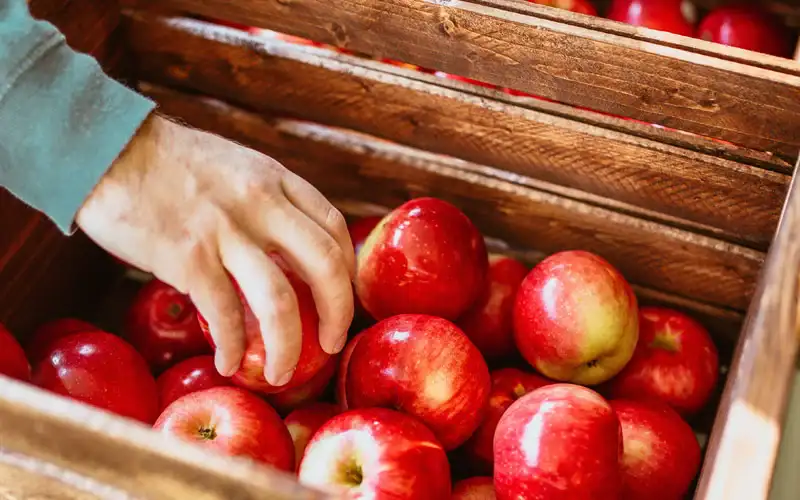
If you want to choose a healthy first fruit for your baby, then you should choose fresh produce. Under no circumstances should canned fruit be used for baby nutrition because the canned fruit contains sugar and preservatives. Dried fruit is also not recommended as it sticks to the baby’s teeth and can cause tooth decay.
Respect the baby’s taste
Always pay attention to the baby’s reactions when you feed fruit and vegetables as complementary foods. Every baby has an individual taste and therefore prefers different foods. It’s no different with fruit. Just because you like melons doesn’t necessarily mean your baby likes them. Respect your baby’s tastes and don’t necessarily force them to like every fruit.
Best first baby fruits
Here we introduce you to the best types of first fruits for baby:
Apple:
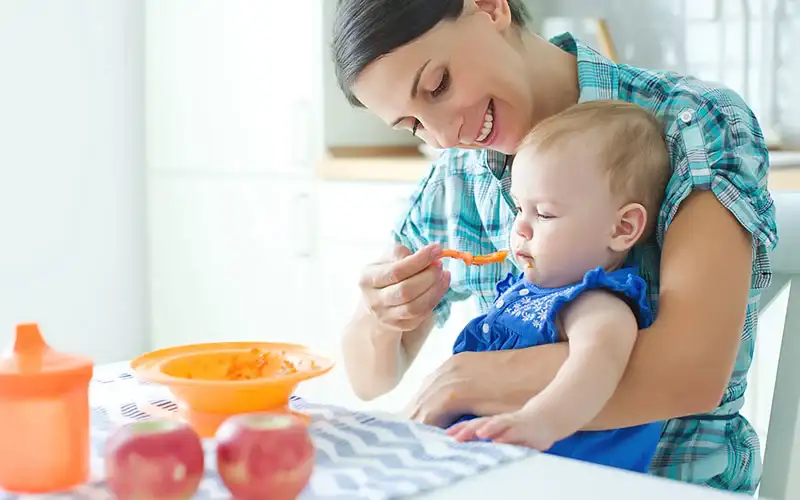
The apple is one of the healthiest fruit and is suitable as the first fruit for babies. The fruit is rich in vitamins and nutrients. Due to a large amount of fiber, apples also contribute to an optimally functioning intestinal flora and make this type of fruit easy to digest. The preparation is easy; Apples can be baked, steamed, or boiled directly in the water. Iranian apples can be pureed and fed directly or processed into apple sauce. Because of the high water content, you don’t need any additional water for pureeing. Apples can also be added to conventional porridge as an additional ingredient.
- For babies from 6th months old
- baked
- steamed
- cooked
- For babies from 8th months old
- raw
- Preparation is possible in different ways
Banana:

An excellent choice as the first fruit for babies. banana provides exceptionally many of essential nutrients, including numerous vitamins and important minerals. This is why this fruit, like the apple, has a very good reputation and is particularly beneficial for health. In general, the banana is easy to digest; only when consumed in large quantities can constipation occur. A particular advantage of this type of fruit is its easy preparation. The banana does not need to be washed or cooked. Simply, you just peel off the skin and then crush the pulp. The banana is therefore ideal as a fruit for traveling.
- For babies from 6th months old
- raw
- Fast preparation
Pears:
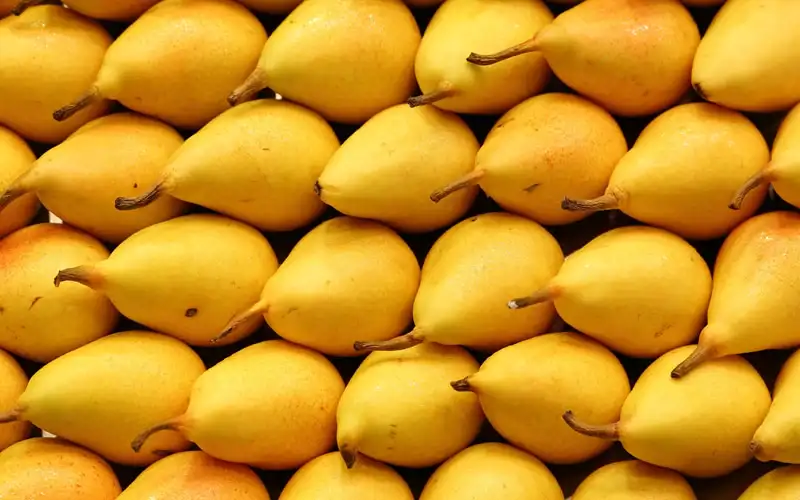
Of course, the pear should not be missing from the complementary food menu. Despite its pleasantly mild and sweet taste, the pear is one of the few fruits with more nutrients than calories. In addition to the important vitamin C, it is primarily the fiber and potassium that makes the pear particularly stomach-friendly. Even the skin of the fruit is easy to digest for babies. Pears, therefore only have to be cooked for very young children and can be fed raw without any problems from the 8th month. Simply squeeze or puree the soft pulp.
- For babies from 6th month old
- steamed
- For babies from 8th months old
- raw
- Easy to digest
- Particularly rich in nutrients
Peach and nectarine:
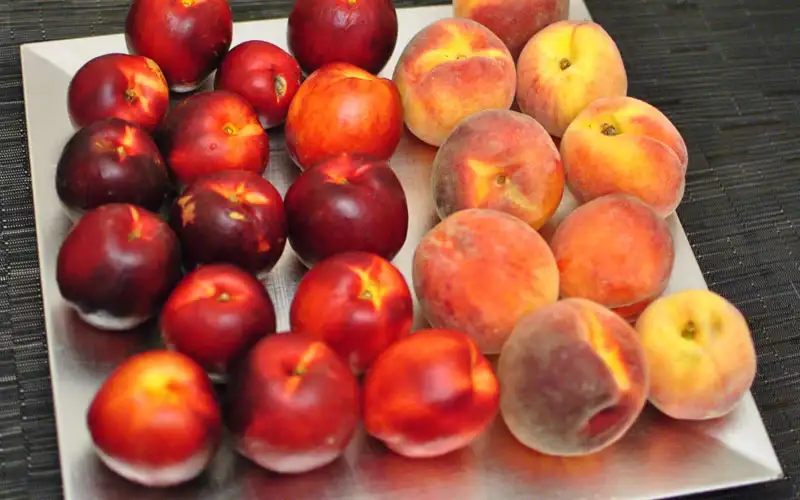
Peaches and nectarines are especially mild and easy to digest, which is why they are particularly popular as baby food. At first glance, the two fruits look very similar because they can only be distinguished on closer inspection of their skin. While nectarines have a smooth, shiny surface, peaches have dull and downy skin. Both fruits are not only beautifully sweet and juicy so that most babies like to devour them but also offer valuable ingredients. Including, of course, a lot of vitamin C and vitamin A, as well as a variety of minerals and important fiber. The fiber, in particular, ensures that peaches and nectarines are good at helping the baby with constipation. The fruits can be fed separately in small crushed pieces or prepared with other ingredients.
- For babies from 6th months old
- poached
- steamed
- baked
- For babies from 8th months old
- ripe peaches also raw
- Mild and tolerable
- Good for the digestion
Watermelon:
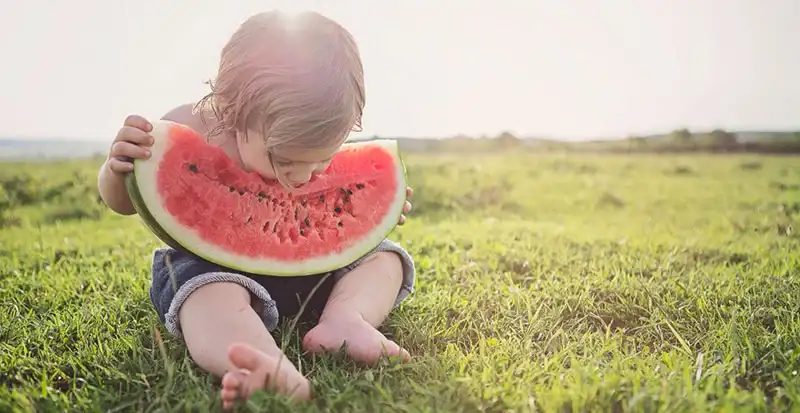
The watermelon can be given as complimentary food very early on. The juicy, sweet taste and soft consistency make them attractive to babies. Melons also provide plenty of vitamin A and C, important calcium for healthy bone formation, and beta-carotene for healthy eye development. The watermelon is best cut into small pieces for the child to nibble on for consumption. However, removing the seeds before feeding is important to avoid swallowing and choking. Parents should look twice! In rare cases, melon can lead to rashes; if this should occur, a consultation with a pediatrician is recommended.
- For babies from 8th months old
- raw
- Remove seeds
Blueberry:
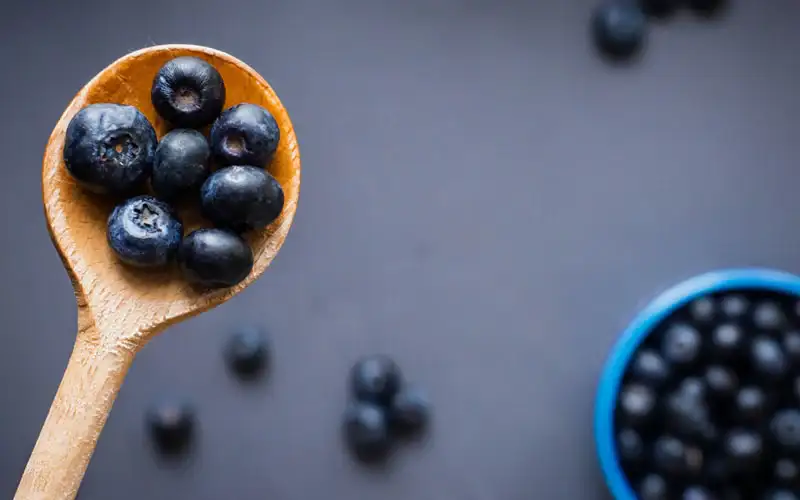
Because of their particularly valuable nutritional content, blueberries are often referred to as the so-called “superfood.” In addition to antioxidants, vitamins, and fiber, the little blueberries are also considered cholesterol-lowering agents, making them so popular with people of all ages. Blueberries are prepared raw. To do this, they are pureed with a little water and can be mixed into any porridge. In contrast to other berries such as raspberries or strawberries, blueberries belong to the heather family and are generally not considered allergenic. Nevertheless, a brief consultation with the treating pediatrician can be made before the introduction.
- For babies from 10th months old
- raw
- Great food
- Particularly rich in nutrients
Grapes:
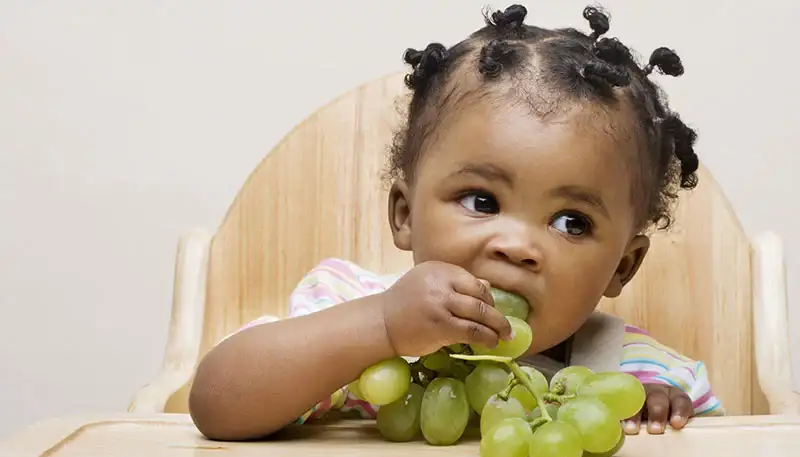
As with other berries, grapes contain a multitude of valuable ingredients. In addition to a huge portion of vitamin C and other vitamins, it is above all the numerous minerals and antioxidants that make grapes so healthy. The delicious grapes can also be used to feed babies. However, there are two points to consider here:
- The skin of grapes should only be given from the 10th month.
- Grapes must be washed off thoroughly. Because often large amounts of fertilizers and pesticides are used so that the grapes keep their great appearance when sold. It is best to use organic grapes here.
Of course, the seeds of the grapes should also be removed before the baby is fed.
- For babies from 10th months old
- raw
- Remove cores
- Rinse thoroughly
Orange:
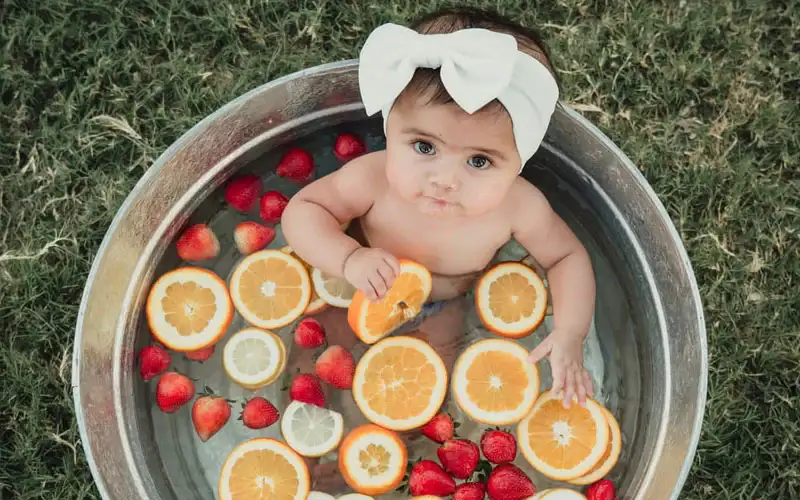
Citrus fruits such as oranges or grapefruit are primarily known for their high vitamin C content, which strengthens the immune system and has numerous other positive properties on the human body. However, since citrus fruits are very acidic, they are difficult to digest. So you should therefore wait until the baby’s digestive system become strong enough. From age 1, citrus fruits can be a valuable vitamin C source.
- For babies from 12th months old
- raw
- Very good source of vitamin C
- Strongly acidic
Plum:
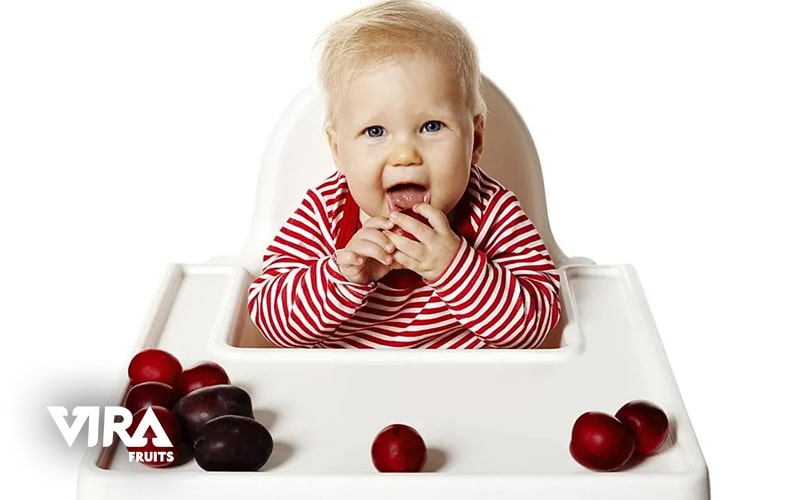
Plums contain potassium, vitamin A, vitamin C, and vitamin K, all essential nutrients that promote nerve function and build bones, blood, and cells. Antioxidants and soluble fiber are also contained in the fruit, contributing to the diversity of friendly bacteria in the gut, supporting digestion, and maintaining optimal cell function.
In addition, plums have a laxative effect, especially in the form of fruit juice or dried. So you can use them when your baby is constipated. There are also different subspecies of plum. Very few people are allergic to plums, but one of them may be your baby.
Different colors of plums contain other nutrients. Plums such as those in the red or purple varieties contain:
- Different antioxidants.
- Thus protecting cells and reducing inflammation, such as quercetin in green plums.
- Anthocyanins in red and purple plums.
These reasons are enough to use plums as the first fruit for the baby.
- For babies from 10th months old
- Smashed
- form of puree
Carrots:
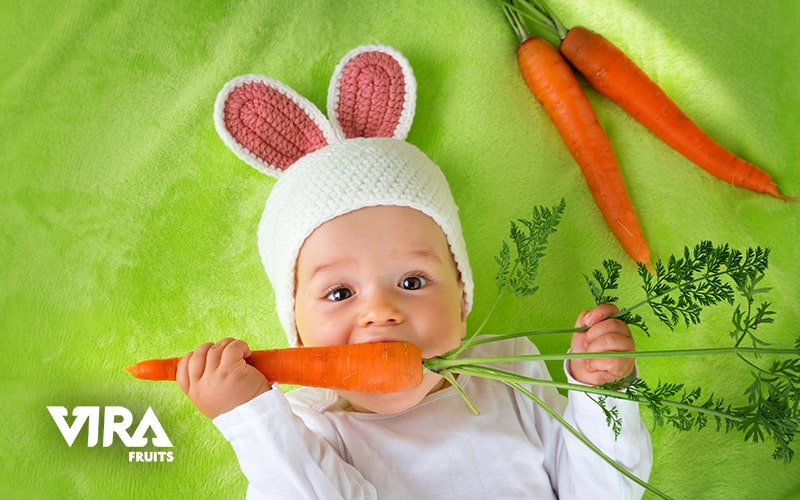
Carrots are the good first fruit for babies, regardless of whether you want to feed your child with porridge or whether you want to use the baby-led weaning method. The carrots have a sweet taste and are readily accepted by children. Carrots are very healthy because they contain plenty of vitamins and minerals such as phosphorus, potassium, calcium, magnesium, iron, and zinc.
- For babies from 6th to 8th months old
- Peel and cut carrots
- Steam or boil
- For babies from 9th to 12th months old
- Peel and chop carrots
- Steam or boil until soft.
Avocado:
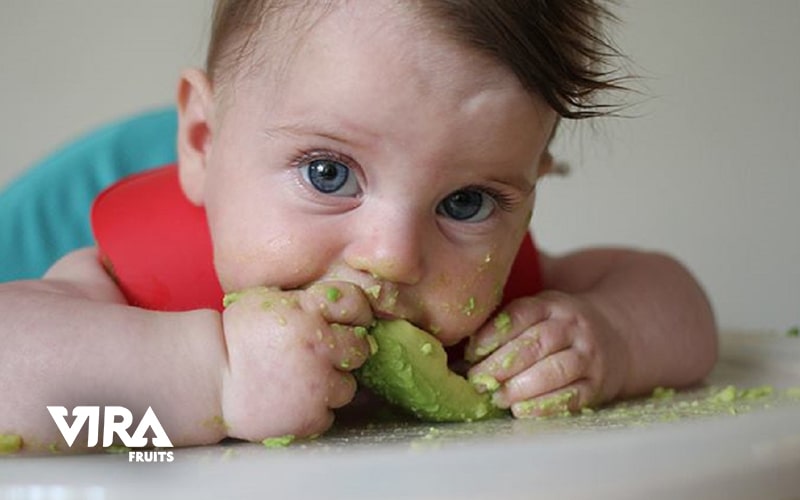
The avocado is another best first fruit for babies. There is a large amount of healthy vegetable fat in this fruit. Vitamin B6, E, and A are also abundant in them. For example, babies need the latter for their eyes and skin. It is essential for cell protection to have vitamin E and for protein metabolism to have vitamin B6. Also, avocados contain potassium, a mineral beneficial to babies’ nerves and muscles.
Furthermore, it is an excellent option for those who wish to offer their baby a little something in between ingredients. It is not necessary to cook the pulp before spooning it out. As early as the fifth or sixth month, avocado is suitable for babies. Before starting complementary feeding, it is essential to wait until the baby has shown signs of complimentary food maturity.
A ripe avocado may shoot out of your baby’s hand due to its slippery nature. To give the avocado some grip, roll it in some dry food.
- For babies from 6th to 9th months old
- serve a whole, halved avocado without the skin or ripe stalks
- Mash avocado and serve it on a spoon
- For babies from 9th to 12th months old
- The raw small sliced avocado
- For babies from 12th months old
- half a smashed or sliced avocado in the bowl with a spoon
Mango:
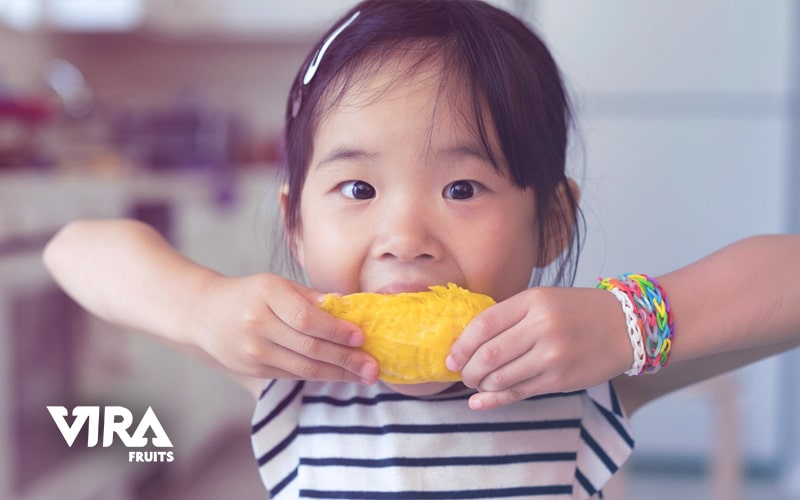
Mango is the second most consumed tropical fruit worldwide after the banana and is available all year round. The mango’s natural sweetness ensures an exotic touch and awakens babies’ taste buds. This makes mango one of the best first fruits to introduce to babies.
Mango contains Vitamin A, which is critical for growth, and Vitamin C, which facilitates the absorption of iron in the body. Mango is richer in vitamins than Apple.
The mango must be ripe, not too green, and not overripe. Choose a smooth, yielding fruit but not too soft. Spots are a sign of overripe fruit, as opposed to too many fibers when the fruit is too young.
Mango can be fed with conventional fruit such as apple or pear. A combination with banana or other tropical fruits is also possible.
Babies can digest mango from 8 months, but it should be cooked well to prevent allergies. When preparing mango juice and mango puree, be aware of the fibrous parts of the fruit, which pose a hazard if the baby swallows them.
At 12 months, ripe cubes can be cut into small pieces or mixed with the compote of other fruits.
- For babies from 8th months old
- Cooked well
- Smashed
- For babies from 8th months old
- cut into small pieces
Melon:
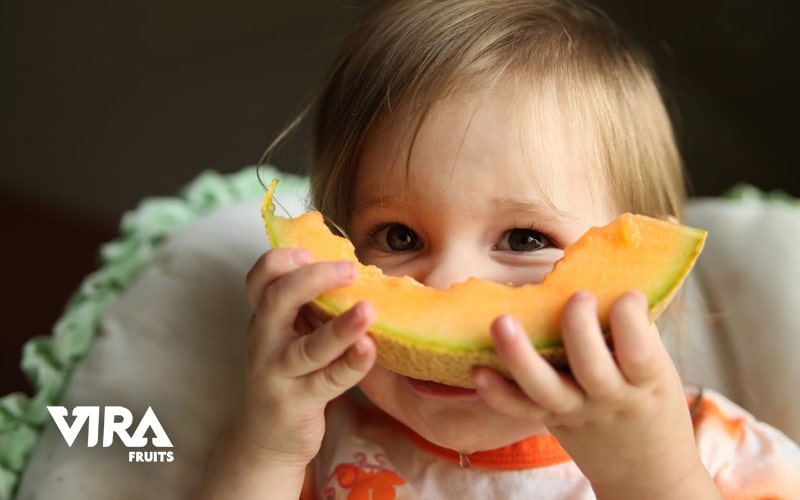
Melon is a great first fruit for babies because of its high sugar content, intense aroma, attractive flesh color, and texture. Melons are excellent for all ages. Their nutritional value, deliciousness, and versatility make them a great choice. When babies are ready for solid foods, usually after six months, you can introduce melon to them.
Melon is one of the easiest-to-digest fruits, which makes it a great starter food for babies. It is easy to chew melons due to their high water content (or suck, if the baby doesn’t have teeth), allowing them to pass through the digestive system smoothly while supplying vitamins and minerals.
Many minerals, vitamins, and antioxidant compounds in melon are known to be anti-inflammatory compounds.
Melon is a good source of vitamin C and pro-vitamin-A, primarily in carotenoids (especially in orange and yellow varieties), an essential micronutrient for a baby’s health. Melons with orange flesh, like cantaloupe, contain the same amount of beta-carotene as carrots.
Muskmelons have more vitamin A and C than bananas, apples, pineapple, peaches, and grapes.
Since melon pulp and rind contain carotenoids and chlorophylls, cutting closer to the skin is best to maximize nutrition.
Water makes up almost 90 percent of melons. By eating cantaloupe throughout the day, you can keep your baby hydrated.
- For babies from 8th months old
- cut into “graspable shapes” about the size of your thumb finger.
- For babies from 10th to 12th months old
- cut melon into larger slices (thicker half-moon pieces) with the rind on or off.
Which fruit for baby from when?
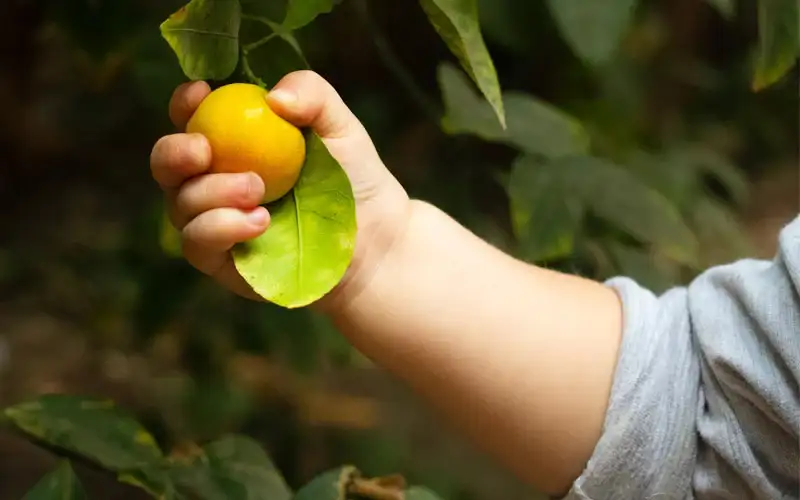
As the baby ages, more types of fruit can be introduced. After starting with the local classics such as apple, pear, or easily digestible fruits such as the banana from the 6th month, you can also approach more exotic fruits such as kiwi, pineapple, or citrus fruits in the further course.
- Fruits for babies from 6th-month-old
- Apple, pear, banana
- Fruits for baby from 8th month old
- Peach, apricot, watermelon
- Fruits for babies from 10th-month-old
- Blueberry, grapes, kiwi
- Fruits for babies from 12th-month-old
- Pineapple, orange
Read about 5 Ways to Get Your Kids to Eat Fruit.
